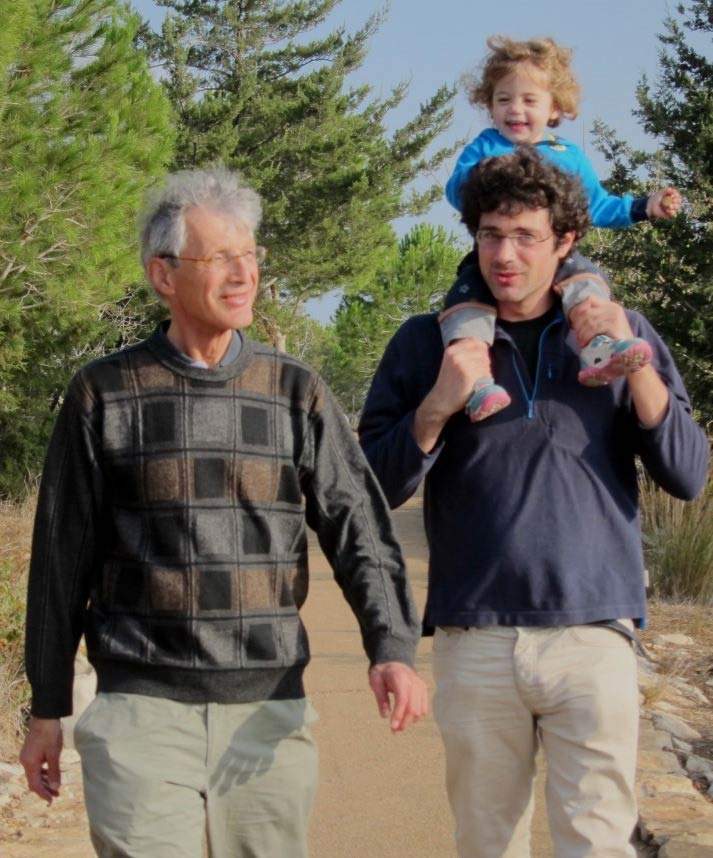“I just want to make it clear that I had nothing to do with my son’s decision to come here; that was completely his own choice,” says Dr. Harry Towbin. Towbin, recently retired from the Federal Institute of Technology (ETH), Zurich, completed his PhD at the Weizmann Institute close to 40 years ago. He and his wife, Marion, were recently at the Institute visiting their son, Dr. Benjamin Towbin, who is currently a postdoctoral fellow in the Institute’s Molecular Cell Biology Department.
After completing his MSc at ETH, Harry had decided to continue his studies in Israel – he felt the need for a “change of atmosphere.” He had previously been to the country as a tourist and to visit family in Tel Aviv. “This was in the days before Internet,” he says. “So I got on a plane and spent a few days staying with my relatives and looking around.”
In 1973, Harry ended up in the lab of Prof. David Elson in Weizmann’s Biological Chemistry Department, where he worked on the structure of the ribosome. A short time after he arrived, the Yom Kippur War broke out. Research in the lab ground to a halt as its members were called up, so Towbin and a friend went to volunteer on a kibbutz in the south of the country, helping out in the chicken coops. Soon enough, however, the lab work started up again.
Towbin found the relatively small, intimate size of the Institute and its research groups to his liking. When Marion, whom he had met in Switzerland, finished her studies in pharmacology, the two married and she joined him in Israel. Harry continued his research, and Marion found a position as a lab technician in the neurobiology lab of
Prof. Zvi Vogel.
“We got to know the country quite well,” says Towbin, “especially the desert. We both like to hike, and we miss the desert when we are in Switzerland.”
When the Towbins returned to Switzerland, Harry took up a position at the Friedrich Miescher Institute (FMI) for Biomedical Research in Basel. There, he and his colleagues developed the technique for the Western blot tests used today in almost every biology lab in the world. “Some elements of the technique were inspired by the work done in David Elson’s lab,” he says. Harry then moved to the pharmaceutical company, Ciba-Geigy, which would later become Novartis. In his lab there, he continued conducting basic research in immunological chemistry. When the company downsized, just as he was turning 60, Towbin retired and accepted an invitation from ETH to join its faculty. Now he is there part time, mainly consulting and working with students, which he greatly enjoys. “As a scientist, you never completely break with your work,” he says.
Benjamin, the younger of Towbin’s sons, was also drawn to scientific research. (His older brother is an economist.) He completed his PhD in Basel, at FMI, but he already knew he wanted to conduct postdoctoral work outside the country. Both he and his wife, Christine, were familiar with Israel, making it a comfortable choice. But what truly attracted Benjamin was the research of
Prof. Uri Alon of the Weizmann Institute’s Molecular Cell Biology Department. Benjamin had been following Alon’s work in the field of systems biology for a number of years. “I found it exciting,” he says. So when Alon spoke at a conference in Basel, Benjamin approached him and Alon ended up inviting him to the Weizmann Institute.
At the Institute, Alon arranged for Benjamin to meet with a number of research groups. “All of them were fascinating,” he says, “but I ended up in Uri’s group, as had been my initial plan.” Benjamin is an experimental “wet-lab” biologist; his PhD research in molecular biology focused on the spatial organization of the DNA in the nematode C. elegans. Now he is investigating regulatory gene networks in the bacterium E. coli. “This is my chance to learn something new,” he says. “The group is made up of experimentalists and theorists, and what I am learning from the theorists is helping me rethink my experiments.”
Benjamin, Christine and their 1 1/2-year-old daughter live in Rehovot, near the Institute. Christine is starting a postdoc in environmental sciences: She transferred from her research group in Switzerland to that of
Dr. Itay Halevy in the Institute’s Earth and Planetary Sciences Department. After being here for six months they are happy with their choice, says Benjamin, not least because they have found Israel to be a very child-friendly place. They have been made to feel very welcome, he adds, having received valuable help both from members of the lab and from the Institute’s Visiting Scientists Department.
For Harry and Marion Towbin, having a child and grandchild in Israel gives them an excuse to visit more often. Such visits include meetings with Institute researchers who have been his colleagues for some 40 years, among them Profs.
Moshe Oren and Zvi Vogel. And they still take the opportunity to hike in the desert – the day after being interviewed, the family was on their way south from Rehovot on a hiking trip through the Ramon craters.
